Overview of Let’s play VET survey
In Europe, most governments have temporarily closed their office, schools, activities as a measure to contain the spread of the COVID-19. People’s lives in so many countries were radically alternated, since the mobility of persons is limited, and work activities/project activities are often suspended.
The Let’s play VET project (Co-funded by Erasmus plus the programme of the European Union) decided to consider the spreading of the pandemic disease as a non-expected threat and to analyse to what extent it changed the normal working routines of the project. Let’s play VET has contributed in rethinking the teacher paradigm through an innovative VET methodology that is put young VET students at the centre of the learning process in a pro-active way
This survey reports the main result provided by an online consultation from Let’s play VET partners, active in Erasmus+ project meeting and final multiplier event that have been affected. The survey has opened on 24th March 2020 and 6 partners responses by 27th of March 2020.
In the past a few months the world has changed, and the associated measures are affecting the activities, mobility of a lot of students/teachers and companies including Let’s play VET partners. However, the Let’s play VET team is still continue working from home as much as possible
The Let’s play VET partners completed the survey online and EfVET with Associazione Cnos-Fap Regione Emilia Romagna collected answers.
Question 1.
Partner country
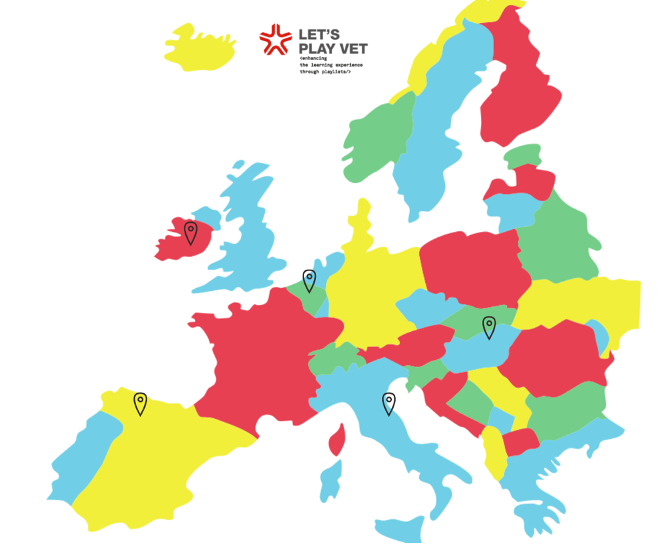
Question 2
Partner
Associazione Cnos-Fap Regione Emilia Romagna
Congregacìon San Francisco de Sale – Instituto Politécnico Salesiano
Bdgecraft Ireland Limited
SZÁMALK
UNISER Soc.Coop.ONLUS
EfVET
Question 3
Type of organisation
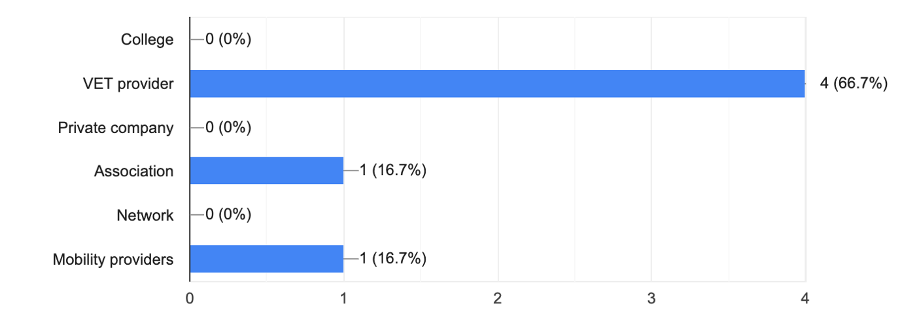
Question 4
Where the mobility of individual and working activities strongly limited in your country/city?
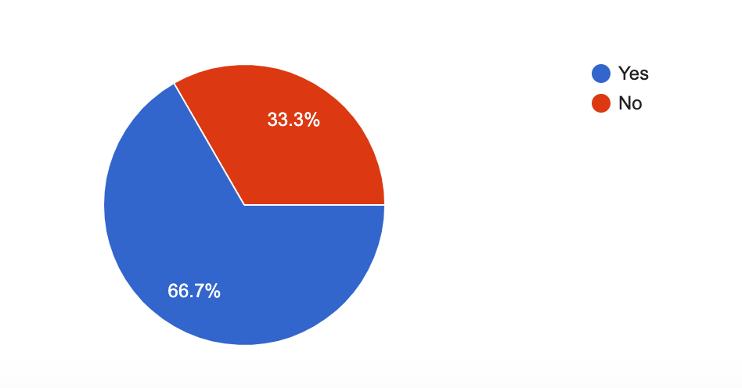
Question 5
If you answered “YES” to the previous question, please explain briefly
- Kindergardens, primary, secondary and post-secondary schools are closed, universities were also ordered to suspend in-person classes and switch to online courses; restaurants and cafes are closed; only grocery stores and pharmacies are allowed to remain open past 3:00PM; everyone is asked to stay at home – only leave home if there is a very important reason: e.g. going shopping for food, medicaments (however, no curfews yet); almost all hairdressers, beauticians, restaurants, cafés etc. have been closed; public gatherings and events in an enclosed space with more than 100 people have been prohibited (e.g. no theatre performances, the zoo is closed, the thermal baths are closed); as many companies are trying to apply home office as possible; severe travel restrictions are in action (to and from the country); there is less public transport – the rule about using only the first door for boarding has been suspended
- Since the 10th March 2020, people are not supposed to go out of their houses except for essential purposes such as working and shopping for food. At the same time, people are allowed to walk around their houses not further than 200m. Only one person per family is admitted to supermarkets to buy food.
- Yes, we are at home since last 19th of March.
- due to the quarantine in Italy, several work activities have been interrupted without the possibility of working from home, while in other cases work through smart working with different difficulties
Question 6
Did you think we will see a new Vocational Education Training after the emergency?
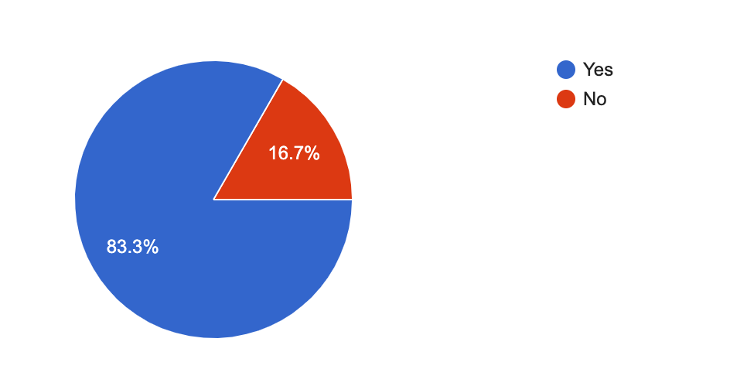
Question 7
What 4 scenarios did your school/organisation put in place as a result of the COVID-19 emergency up now?
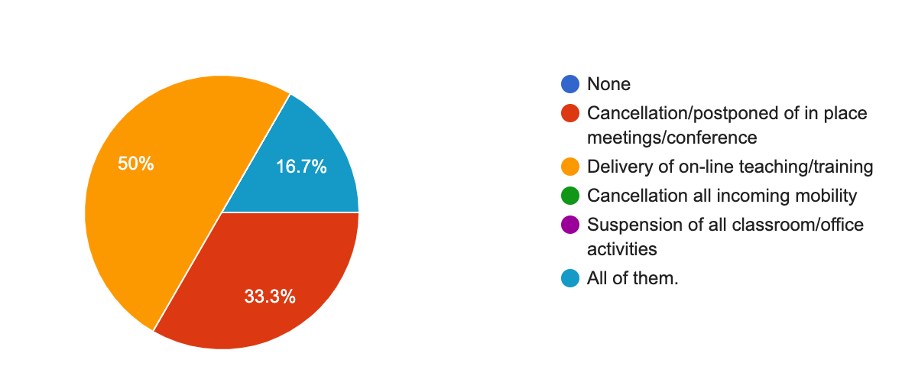
Question 8
Do you have any well-being policy for staff and students who smart work from home?
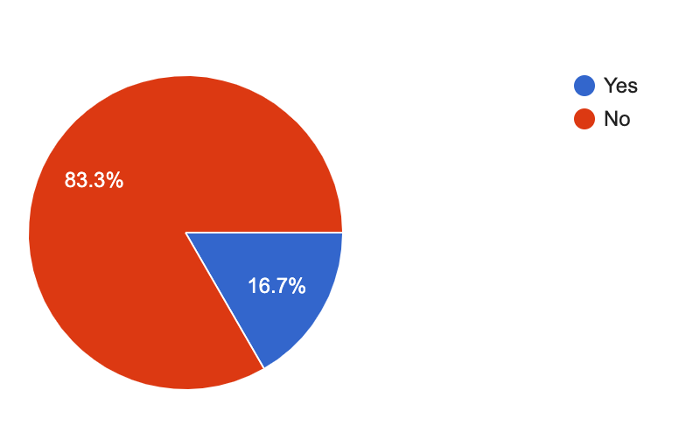
Question 9
If you answered “YES” to the previous question, what kind of support is being provided to students and staff?
- Smart work from home has always been a welfare policy in Uniser
Question 10
Is your school/association providing on-line teaching course?
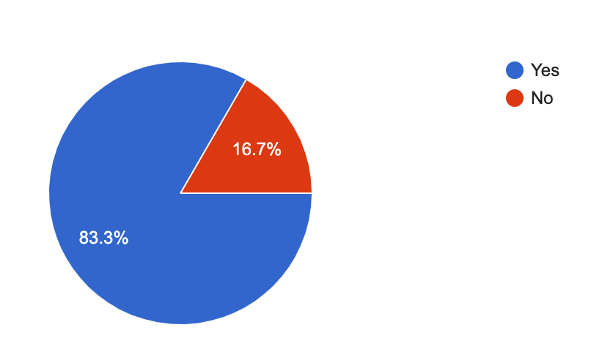
Question 11
If you answered “Yes” to the previous question, please specify:
- Which digital platform(s) you use
- What are the main challenges your school/association is facing in delivering on-line training?
- The school platform is Microsoft Teams. Main challenges: technical/internet problems; largely increased workload of teachers; students having no adequate device for Teams; students having limited access to the devices (they have to share it with other family members); students “getting lost” in using Teams; certain subjects cannot really be taught the same way/quality as face-to-face: there is a relevant loss of efficiency, e.g. practical lessons, off-site practices, communicative language classes with more than 10 students; especially after 1 month: students becoming less motivated, mental well-being issues during the quarantine
- Google meet, Google classroom. There are several challenges that needed to be faced for a VET centre as ours that mainly deals with students in difficult situations.
- not all students have an internet connection available 24/7 and often it is not stable enough for connecting
- not all students have pcs, and they try to do their best with a cell phone
- students with general learning disorders are left on their own and teachers often do not how to help them in presence, let alone online.
- long lessons are not easy to stand for students that are used at practical training
- families sometimes have no ICT preparation to help students with technological matters
- parents are often working (luckily) and students are often left on their own
- adolescents are having problems in maintaining the normal life rhythm: confused sleeping habits are worsening, video game and screen addictions are seriously going out of their hands.
- houses are crowded with people and students do not have their personal space to follow online lessons
- sometimes there is one PC available and more than one student that needs to follow online lessons
- coronavirus infections in families
- Google Classroom, Drive, Meet, hangouts. The main challenge is to organise the workshop activities on-line.
- The platforms we use on a daily basis are google meet and classroom for online learning. We upload all the material on the various classes created, so students can study and download it and are also carried out checks always with the same platform. It is not easy to be able to involve the students for so many hours of lessons in front of mobile phones, tablets or Pc, because they get distracted and attention drops dramatically. try to create lessons as challenging as possible to involve the students
Question 12
Does the government take into consideration the psychological impact of this crisis on teachers, students and apprentices?
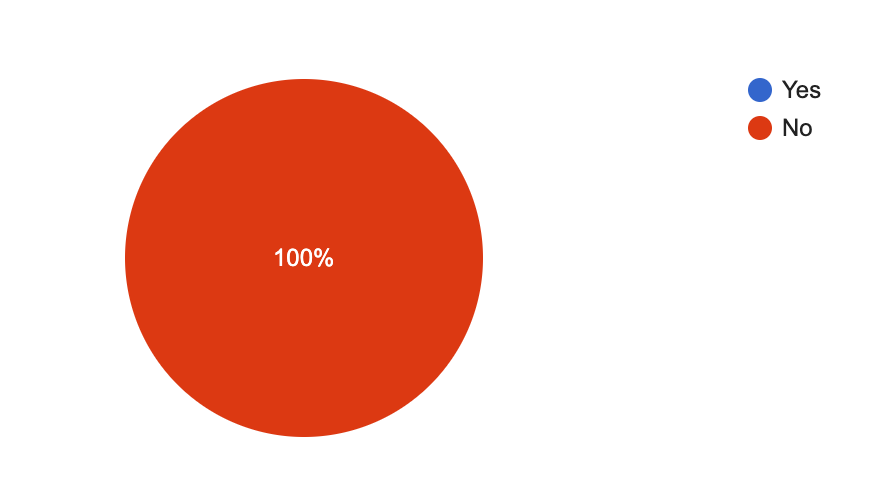
Question 13
Do you think that Let’s play VET activities will be seriously affected by the present sanitary emergency? Please explain
- They were already affected because we are not able to organise Multiplier Event, to meet in the final meeting, to disseminate the activities. As the organizations are also having hard times it is going to be hard to go back to normal life.
- Some of them Yes, like mobilities and multiplier events.
- Carrying out testing, meetings, dissemination activities, mobility experiences will have to be postponed – thus we are not able to deliver results as previously expected
- Yes, very seriously. Mobility experiences will not take place (these were foreseen for 15 students and 3 tutors) and that was the most attracting part of the project for students. The partnership is trying to readjust activities in order to replace mobility experiences but this is going to take time to replan and reimplement and not as appealing to students. Financially speaking, mobility covers about 15% of the budget, we succeded in using half of it last year, and we are trying to replan the remaining part on other activities according to the NA acceptance of our changes. Multiplier events will be probably online as well as the final event and of course, this is going to be quite impersonal and less involving. The activities dedicated to students and teachers (testing new playlists, teaching teachers how to use our platform) will be online too, but it will be perceived as a burden, not as an innovative activity, due to the long time spent online during the day already. Probably the project will be prolonged, with additional management costs.
- Of course. Firstly, our students couldn’t enjoy their mobilities. Soundly, it’s difficult to organise the testing. Also it’s been difficult to prepare the multiplier even.
- Unfortunately, there will also be problems with mobility definitely, but I think this can also be a good time and an opportunity to test with students and colleagues finally the platform we have been working on for years, just at a time like this to help us in our daily online work.
Question 14
What are your suggestions and proposals to limit the negative consequence on the final Let’s play VET results-making process?
- Extend the project with three or four months.
- Make multiplier event online and apply the concept of internationalisation at home giving some incentives to a student.
- We should ask for a project extension. carrying out testing is not necessarily easily done/monitored/supervised now. We should move the final meeting either to a later date or online. Student mobilities have to be postponed, but to which date or they will have to be cancelled or we should transform them to an online meeting version – it is absolutely uncertain now.
- Ideally, we should suspend (freeze) the project and restart it when the situation will allow it. Flexibility of the Agencies in replanning activities.
- It would be great to extend the project for two more months.
- I hope you can continue with online meetings as we did on Wednesday, to be able to continue the work on the platform.
Question 16
How you see the future of online mobility
- no future of online mobility…
- Internationalisation at home, in general, it is an obligatory choice for many students as a general rate of participation to mobility project was really low even before the COVID-19. Having said that, I believe that, in these circumstances, concrete efforts should be made in order to make online mobility.
- Student mobilities have to be postponed, but to which date or they will have to be cancelled or we should transform them into an online version – it is absolutely uncertain now. We would prefer mobilities in the original form at a later time.
- I see online mobility strictly in connection with smart working: students could for example work for foreign companies like if it was a smart trainship. But Mobility means travelling and that is what students like most.
- I’m not sure at the moment.
Question 17
What do you think will be the impact of COVID-19 on students, teachers and your organisation?
- Everything will be delayed. Graduating, finishing projects etc. But one way or another, everything will be fine in time.
- Impact on the long term now is difficult to estimate, for sure our organisation would be affected on the short-medium term.
- Teachers: intensively increased workload and stress; negative impacts of the lack of socializing (teachers, students alike); if online teaching has to go on for a longer time: student will become less motivated; the end-of year final exams for our leaving students have been modified – all the oral exams were cancelled; e.g. for art students all the exams are cancelled – it is very demotivating as they have been working a lot with their portfolios. Online teaching may bring some proposal as well (e.g. new methods for a later time), but all in all, school teaching is much better face-to-face in all respects.
- Rearrangement of training courses in terms of division of practical and theory lessons (if lessons will go on online, practical lessons will be less and less possible undermining thus the real essence of Vocational Education and there will be more and more theory lessons) This will imply also a revision of the staff needed in vocational education centres. Students will be asked to adopt all the safety measures required by the decrees and laws that will be issued, this will create distance between them.
- We’ll be better prepared in case of a similar scenario. It’s important to teach our student how to work online in the event that something similar happens at the end of the year.
Conclusions
The current results show that schools/education association are not prepared for distance learning. This crisis also gives us the opportunity to rethink our project/schools/mobility models and find new innovative methods of teaching. This period can be taken as an experimenting period to test new online outcomes, platform and assessment methods. However, we noticed that technology cannot replace meetings/classroom/events and the face-to-face interactions between students/participants/teachers/partners are most important that the social aspects of learning are fundamental.

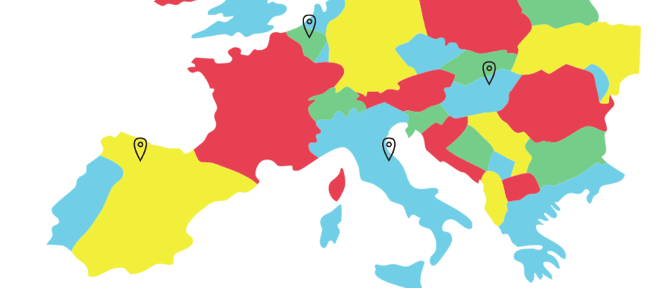

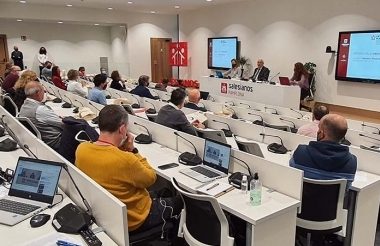
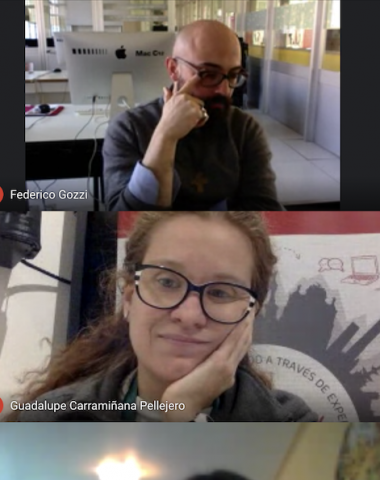

Add Review